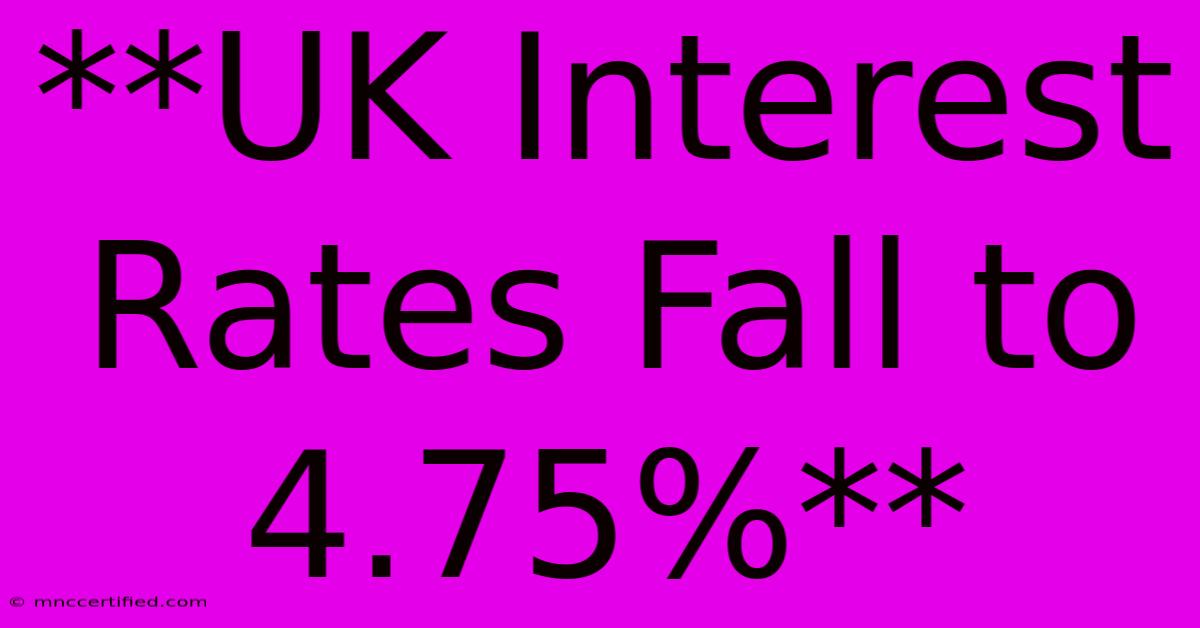**UK Interest Rates Fall To 4.75%**

Table of Contents
UK Interest Rates Fall to 4.75%: What Does This Mean for You?
The Bank of England (BoE) has announced a surprise cut to interest rates, dropping them from 5.00% to 4.75%. This unexpected move has sent ripples through the financial markets and sparked debate about the future of the UK economy.
This article will delve into the implications of this recent rate cut, exploring its potential impact on borrowers, savers, and the wider economy. We'll also examine the reasons behind the BoE's decision and consider what this could mean for future interest rate movements.
Why Did Interest Rates Fall?
The BoE's decision to cut rates comes amidst a backdrop of growing economic uncertainty. While inflation has shown signs of easing, it remains stubbornly high at 8.7%, significantly above the BoE's target of 2%. This high inflation has been exacerbated by the ongoing cost of living crisis, which is putting significant pressure on households and businesses alike.
The BoE's primary objective is to control inflation and ensure price stability. By lowering interest rates, the BoE aims to stimulate economic growth and boost borrowing and spending, ultimately helping to reduce inflation. However, this move also carries risks, as it could lead to a further weakening of the pound and potentially fuel further price rises.
What Does This Mean for Borrowers?
Lower interest rates are generally good news for borrowers. This is because they will pay less interest on their loans, such as mortgages, credit cards, and personal loans. For example, someone with a £200,000 mortgage could see their monthly repayments drop by a significant amount.
However, it's important to note that not all borrowers will benefit equally. Those with fixed-rate mortgages will see no immediate impact, while those with variable-rate mortgages will experience a more immediate benefit. It's also worth considering that lenders may not pass on the entire rate cut to their customers.
What Does This Mean for Savers?
The rate cut is generally bad news for savers, as their returns on savings accounts are likely to fall. This is because banks are typically quick to lower interest rates on savings accounts, while they may take longer to adjust the rates on loans. As a result, savers could see a significant reduction in the interest they earn on their savings, further eroding the value of their money.
Implications for the UK Economy
The impact of the rate cut on the UK economy is still uncertain. The BoE hopes that it will help to stimulate economic growth and support businesses, but it could also lead to unintended consequences.
Potential benefits:
- Increased borrowing: Lower rates could encourage businesses and individuals to borrow more money, leading to increased investment and spending.
- Reduced debt burden: For borrowers, lower interest rates mean lower monthly repayments, potentially freeing up more disposable income.
- Boost to housing market: Lower mortgage rates could make housing more affordable, potentially stimulating activity in the property market.
Potential risks:
- Further weakening of the pound: Lower rates could make the pound less attractive to foreign investors, potentially leading to further depreciation.
- Higher inflation: While the BoE aims to reduce inflation, there is a risk that the rate cut could lead to higher prices in the short term.
- Increased economic uncertainty: The current economic climate is already fraught with uncertainty, and the rate cut could add to this, making it harder for businesses to plan for the future.
What Happens Next?
The BoE's decision to cut rates has left many wondering what lies ahead for the UK economy. The future path of interest rates will depend on a number of factors, including the pace of inflation, economic growth, and the performance of the global economy.
The BoE has signaled that it will continue to monitor the economic situation closely and adjust its monetary policy as needed. This means that further rate cuts or increases are possible in the coming months, depending on how the economic landscape evolves.
It's important to stay informed about developments in the UK economy and the potential impact of interest rate changes on your personal finances. This information can help you make informed decisions about borrowing, saving, and investing.
Key takeaways:
- The BoE has cut interest rates from 5.00% to 4.75% in a surprise move.
- The rate cut is aimed at stimulating economic growth and reducing inflation.
- The move is generally good news for borrowers but bad news for savers.
- The impact of the rate cut on the UK economy remains uncertain.
Remember, this article is intended to provide general information and should not be taken as financial advice. It's crucial to consult with a qualified financial advisor for personalized guidance.

Thank you for visiting our website wich cover about **UK Interest Rates Fall To 4.75%**. We hope the information provided has been useful to you. Feel free to contact us if you have any questions or need further assistance. See you next time and dont miss to bookmark.
Featured Posts
-
Great Lakes Independent Insurance Agency
Nov 08, 2024
-
Mark Robins Fired Coventry Citys Loss
Nov 08, 2024
-
Kimmel Emotional After Trump Victory
Nov 08, 2024
-
Outer Banks Season 4 Finale Breakdown
Nov 08, 2024
-
Outer Banks Is That Season 4 Part 2 Ending Twist Major
Nov 08, 2024